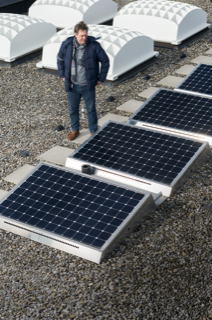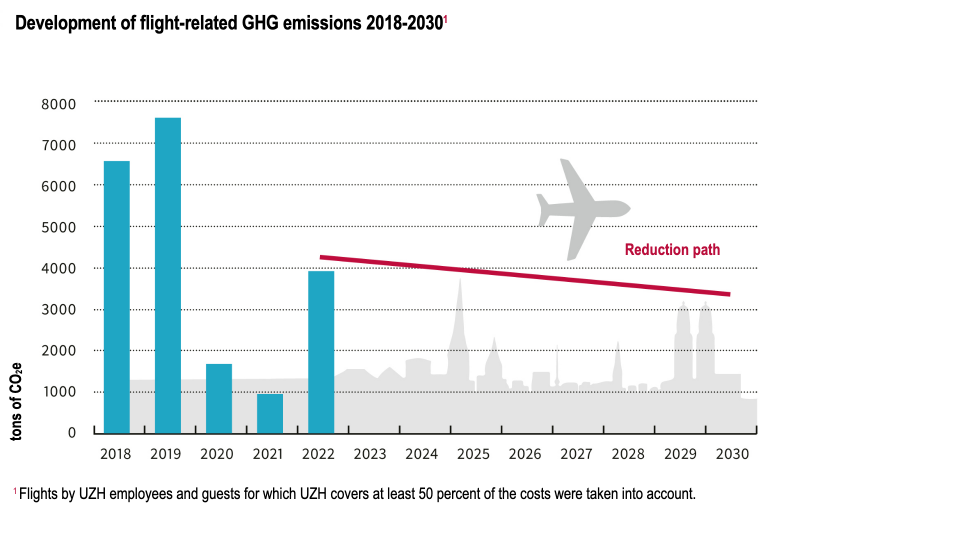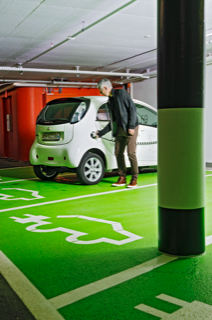Navigation auf uzh.ch
Navigation auf uzh.ch

The University of Zurich has roughly 27,800 students and 9,900 employees. The University has approximately 350,000 square meters of main usable area distributed throughout some 200 buildings. These numbers alone show the importance of carefully using energy and other resources for heating, commuting, business trips, cafeterias, lighting, computers, and other work and study-related activities. The Sustainability Team aims to coordinate already existing projects at UZH and to develop new initiatives. Our overall goal: To work together with UZH staff and students to make university operations more and more sustainable and to contribute to UZH's commitment towards climate neutrality in 2030.
The following bullet points provide a rough overview of the current sustainability activities at UZH in English. Detailed information (in German) can be found in the Sustainability Report.
Sustainability Report 2021/22: Environment and Resources
Through the purchase of energy and other goods and services, UZH causes direct and indirect greenhouse gas emissions (GHG emissions, measured in CO2 equivalents, CO2e).

Compared to the pre-pandemic years 2018 and 2019, UZH was able to reduce air travel related GHG emissions (6545 tons of CO2e in 2018, 7587 tons of CO2e in 2019, 950 tons of CO2e in 2021). The target for 2022 was not to exceed 60% of pre-pandemic levels. This target was achieved.
The main GHG emitting category is now electricity and heat consumption with 7791 tons of CO2e. Nevertheless, since UZH obtains its electricity from hydropower and increasingly covers its heating needs with district heating, energy-related GHG emissions are at a consistently low level and have decreased significantly compared to 2010.
Other cause categories for GHG emissions have been commuter traffic (3381 tons of CO2e in 2022), cafeteria food provisioning (3138 tons of CO2e in 2022), vehicle fleet (217 tons of CO2e in 2022) and paper manufacturing (65 tons of CO2e in 2022).

One of the provisions of the Energy Guidelines of UZH is the continual reduction of environmental pollution through energy conservation and efficiency (Paragraph 2.1., UZH energy guidelines, in German). A measure-based agreement between UZH and the Department for Waste, Water, Energy and Air of the Canton of Zurich aims to reduce UZH's energy consumption from 2018 to 2027. UZH has been able to fulfil the agreement since 2018; among other things, through the installation of PV systems, conversion of lighting to LED and energy efficiency measures in the area of heat supply.
In 2021, UZH consumed 135 GWh of energy for heating and electric power. In 2022, this number decreased to 125 GWh.
Solar power
Electricity from solar power has been generated on some of UZH’s rooftops since 1990. Even if self-generation through photovoltaic systems is still hardly significant in terms of total demand, there has been a clear increase. In 2022 a total of 0.33 GWh was produced. In the long term, 10 percent of the electricity demand is to be covered by own production from solar energy.
During the reporting period of 2021/2022 a PV system with a capacity of around 102 kWp was built on the new laboratory building UZI 5.
Air travel and commuting have been responsible for a significant amount of GHG emissions at UZH in recent years. As long as air traffic is dependent on fossil fuels, there is a conflict between academic mobility and climate protection that affects all academic institutions. The UZH is part of various Swiss and international networks to foster exchange on the topic of sustainable mobility.
UZH aims to reduce air travel related emissions. Therefore the reduction path was defined as shown in the graphic. Read more about UZH air travel on the designated webpage.
Air Travel at UZH.

The choice of transportation for commuting to the university is an important factor in the University’s energy consumption and CO2e emissions. For this reason, the UZH energy guidelines strongly advise students and employees to use public transport for commuting.
Factsheet Commuter Traffic (PDF, 407 KB)
In the 2021/2022 reporting period, the UZH completed a master mobility management concept for the entire university, which is necessary – also in terms of planning law – for the dynamic development and concentration on the two main locations of Zentrum and Irchel.
Since June 2016, UZH will only purchase replacement vehicles for its infrastructure department fleet, if they are electric or plug-in-hybrid vehicles. Exceptions exist for specialty vehicles.
Procurement strategy for vehicles of the UZH infrastructure department (PDF, 82 KB) (in German)

The higher the demand for usable space, the higher the environmental impact. This is because buildings contain a lot of embodied energy and the enclosed space must be heated and maintained. In 2022, UZH used 223 buildings with a total of 351,005 square meters of main usable space.
Due to increasing student and employee numbers, new buildings have to be planned and constructed in some cases. In principle, ambitious sustainability targets are defined for new buildings, overall refurbishments and adaptations of use. Compliance with this is proven based on the Canton of Zurich's «Standard Nachhaltigkeit Hochbau» with appropriate standards and certifications, for example DGNB/SGNI Gold (Deutsche Gesellschaft für Nachhaltiges Bauen/Schweizer Gesellschaft für Nachhaltige Immobilienwirtschaft) or Minergie-P, -A or -Eco. The UZH also pays attention to creating and maintaining high architectural quality.
In the Implementation Strategy 2023 for the Sustainability Policy, the UZH has set itself the goal of maintaining its areas according to the criteria of high and site-appropriate biodiversity. Read more about biodiversity at UZH on the designated webpage.
Biodiversity on UZH sites
Since 2018 fresh water consumption has decreased significantly despite the increasing number of employees and students. In order to reduce fresh water consumption, UZH collects rainwater on its roofs, which is used for cooling and for toilets, fountains, animal stables and gardens.
Since May 2022 UZH is part of the international network Blue Community. The network foucuses on sustainable water management and works to ensure that water supply and use remain in public hands. Blue Community supports a functioning public drinking water supply and maintain a long-term exchange of knowledge and experience. Read more about UZH as member of Blue Community on the designated webpage.
Blue Community
The environmental impact of various foods differs greatly, as do the social factors related to their production, transportation, processing and packaging. The caused environmental pollution is relevant for sustainable development.
Factsheet Food in University Life (PDF, 488 KB)
UZH wants to ensure that sustainability is taken into account in the food offerings in canteens and at caterings. The canteens and cafeterias are operated by the ZFV which has set its own goals to strengthen sustainability.
In January 2022, the pilot project "Food2050" started at campus Irchel. By providing guests with information on the global warming potential of their menu, it aims at raising awareness for sustainable food.
Food2050
Globally, more than one third of all food produced ends up as food waste. UZH focuses on preventing food waste and other waste. In general, food waste measurement takes place twice per year.
ZFV cooperates with the association Centrale Végétale. They use vegetables that do not correspond visually to the norm and have been sorted out by farmers. Moreover, in 2022, ZFV signed the cross-sector agreement on the reduction of food losses. Within this framework, measurement methods and indicators are being developed to track progress towards the reduction target of 50 percent by 2030 across the entire food chain in Switzerland.
In 2015, UZH student Jasmin Küng analyzed in her master thesis the amount of plate waste at one of the canteens at UZH. On average, the food waste per plate amounted to 23 g. She identified the reasons for this food waste as well as potential measures to reduce it. According to her results, about 3.4 t of food could be saved per year at the canteen under study, provided that adequate measures were to be implemented.
Master thesis by Jasmin Küng: Identifying and evaluating plate waste reduction potential at a Swiss university canteen (PDF, 620 KB)
In 2019, the reCircle reusable system was implemented throughout the university to reduce the use of disposable tableware; this eliminates the need for disposable containers. For a deposit, guests receive a reCircle reusable container for their coffee or take-away menu.
The renovation of the cafeteria "Platte 14" was used to implement a zero-waste concept for the reopening in 2019. Dishes are sold in reusable containers such as reCircle containers or jars. The concept shall in the future be extended to other canteens and cafeterias.
At UZH, caterings take place regularly. In order to make it as easy as possible for the organiser to offer sustainable refreshments, UZH has developed together with ETH Zurich a guideline for sustainable catering. In March 2017, the guideline was accepted by the Executive Board of the University.
You can send the questionnaire, which is included in the appendix, to catering suppliers in order to compare the different offers in terms of sustainability. The Sustainability Team collects the responses and is happy to send you already filled in questionnaires. In order to allow the archiving of responses, please send new responses to info@sustainability.uzh.ch.
Guideline Sustainable Catering (PDF, 278 KB)
Appendix to the Guideline Sustainable Catering - consideration of sustainability criteria (PDF, 284 KB) (to be completed by the caterer)
According to the "Umsetzungsstrategie 2030 zur Sustainability Policy" UZH wants to consider the entire life cycle of production, transport, use and disposal and wants to meet the highest possible ecological and social standards. Reducing new purchases is therefore one focus.
Since fall 2018, UZH has a one-paper-strategy: UZH offers only one type of copy paper in its material and office supply store (Irchel Shop) and recommends its employees to use this paper. The selected paper (Refutura) consists of 100 % recycling paper and fulfils the strict requirements of the environmental label «Blauer Engel». This paper is far more environmentally friendly than fresh fibre paper. The production of fresh fibre paper causes more than 2.5 times more GHG emissions than the production of the paper of the one-paper-strategy (Refutura).
Life cycle assessment of different paper types
Since fall 2018 a new sharing platform for office supplies exists at UZH. Instead of disposing unused office material such as folders or envelopes, UZH employees can pass this on for free to other employees. Employees can either pick up the material themselves or have it delivered via internal mail.
Office Supplies Exchange
Equipment and rooms can be shared with others via the Shared Equipment platform. Equipment that is no longer needed can be passed on or obtained free of charge via the Equipment Exchange.
Equipment Exchange
Shared Equipment
Further information on sustainable procurement
In 2022, UZH participated in the tender of the Canton of Zurich for the procurement and disposal of furniture. Already furniture has been used as long as possible with a duration up to 30 years. In addition, the concept of circular economy shall now be considered as well. Furniture that is no longer functional shall be refurbished and reused whenever possible. For example, old hanging file shelves will be converted into lockable cabinets. These are particularly relevant for mobile workplaces, as envisaged by the future office concept.
Since fall 2022, UZH has also been operating a furniture exchange for used office furniture. Here, office furniture that is no longer needed is offered to students and employees for private purchase.
Used Furniture
For the UZH museums and exhibitions, reusable exhibition furniture is purchased and used flexibly for multiple purposes in order to reduce new purchases.
Sustainable disposal puts the avoidance of waste first, followed by the closing of material cycles through recycling and only then follows the disposal of residual waste in the most environmentally friendly way possible. Some old things can be used as valuable materials for future production.
The following link provides concrete statistics and graphics on waste generation at UZH from 2018 to 2022 in German. The graphic on hazardous waste even goes back to 2006.
Disposal statistics and graphics (German)
One pilot project that tries to avoid waste is the project «new life for pipette boxes». At UZH, numerous plastic products are being used in research, including pipette boxes. Usually these boxes only serve as packaging and dispensers. Many of them are reused, which is sustainable, but unfortunately not always possible. Engaged employees of the Material Center have implemented a project in which the pipette boxes which are no longer used are collected and shredded by an external company. An external recycling company is making new products out of the shredded material which are offered again in the UZH Material Center. The focus of the project was not only on reducing the negative environmental impact but also on creating trust in recycling processes. In the video below, you can see how the boxes are turned into new products.
In March 2017, the Executive Board of the University adopted recommendations for action with regard to sustainable investments. This shall ensure in the long term that investments made by or for UZH reflect the ethical values of UZH. The values identified in the recommendations for action are:
Recommendations for action with regard to sustainable investments (PDF, 164 KB) (in German)
All financial contributions to UZH over CHF 500,000 are handled by the UZH Foundation. The Foundation is implementing the recommendations for sustainable investments and takes sustainability aspects into account in all investments since mid-2018. The assets of the Foundation are managed by three banks, which use their own methods for selecting sustainable stocks. In 2021, the UZH Foundation commissioned an external service provider in order to examine the products in the portfolio in terms of their impact on climate change, their footprint according to nine criteria (including biodiversity, education, labor market) and their influence on nine megatrends (including climate, health, age, digitalization). It turned out that the portfolio currently unfortunately still has a so-called global warming potential of 3.4 degrees, which contradicts the goals of the UZH Foundation. Therefore UZH Foundation descided the significant reduction of the warming potential of their portfolios.